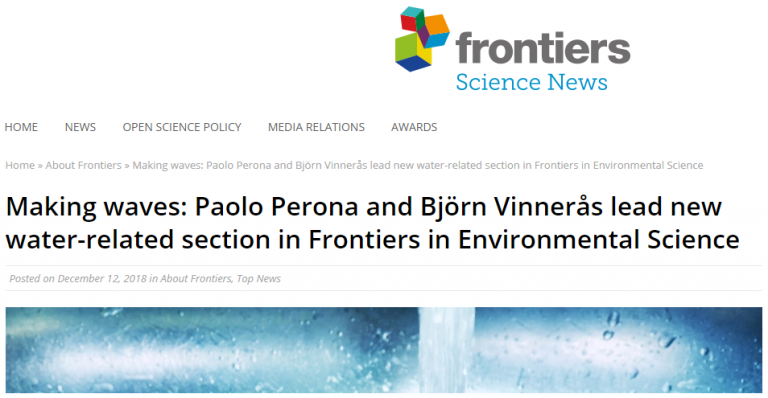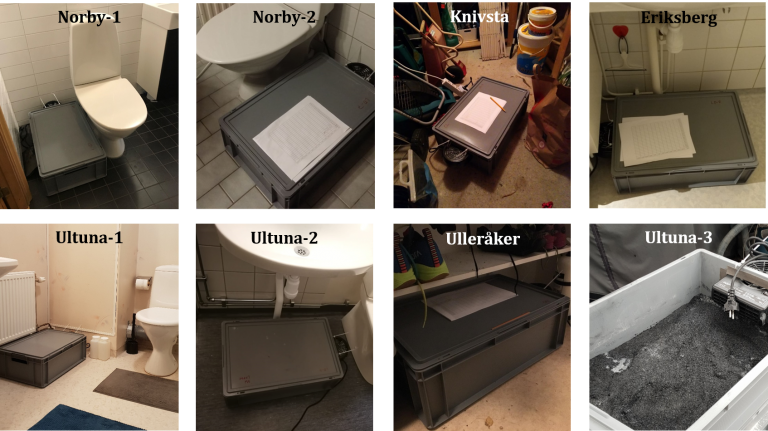
A new section about water and wastewater has been launched as a speciality section in the journal, Frontiers in Environmental Science. Björn Vinnerås together with the co-chief editor, Prof. Paolo Perona and the members of the editorial board welcome contributions to the journal. We aim at publishing pioneering, high-quality research in key areas of integrated and sustainable water and wastewater resources management. These include, for instance, uses and processes involving surface- and groundwater bodies, engineering techniques with a focus on upstream work, virtual water networks, innovative water and wastewater treatment solutions in humid, semiarid and arid regions, analytical and numerical modelling as well as the use of innovative algorithms devoted to the analysis of big-datasets. For more information see the following blog post: https://blog.frontiersin.org/2018/12/12/making-waves-paolo-perona-and-bjorn-vinneras-lead-new-water-related-section-in-frontiers-in-environmental-science/ Or directly at the home of the section, available at this link





 On November 27th, members of the Environmental Engineering group presented results at the MACRO final conference in Stockholm. The project MACRO (Food in Circular Robust Systems) aimed at stimulating innovation for source-separated management of urban organic waste flows within both municipalities and technology suppliers. The project has contributed to filling knowledge gaps regarding both technology and organizational structures. Through MACRO, more opportunities have been created for Swedish actors to develop cutting-edge knowledge in this area, which increases the opportunities for Sweden to positively contribute to the development of the sustainable cities of the future. Our group has contributed with research into the potential for black-soldier fly composting of food waste from kitchen grinders and studies of organizational prerequisites for implementing source-separated system.
On November 27th, members of the Environmental Engineering group presented results at the MACRO final conference in Stockholm. The project MACRO (Food in Circular Robust Systems) aimed at stimulating innovation for source-separated management of urban organic waste flows within both municipalities and technology suppliers. The project has contributed to filling knowledge gaps regarding both technology and organizational structures. Through MACRO, more opportunities have been created for Swedish actors to develop cutting-edge knowledge in this area, which increases the opportunities for Sweden to positively contribute to the development of the sustainable cities of the future. Our group has contributed with research into the potential for black-soldier fly composting of food waste from kitchen grinders and studies of organizational prerequisites for implementing source-separated system. 


 We found that the substrate properties that had the largest impact on biomass conversion ratio and larval development was the daily larval feeding rate of organic material and proteins, while only the daily feeding rate of organic material impacted the final prepupal size. The feedstock found to be most promising for black soldier fly treatment were abattoir waste, a mixture of abattoir waste and fruit & vegetable waste, food waste and human faeces. The feedstock that did not show great promise (low biomass conversion ratio, long larval development time) were the sewage sludges and fruits & vegetable waste.
We found that the substrate properties that had the largest impact on biomass conversion ratio and larval development was the daily larval feeding rate of organic material and proteins, while only the daily feeding rate of organic material impacted the final prepupal size. The feedstock found to be most promising for black soldier fly treatment were abattoir waste, a mixture of abattoir waste and fruit & vegetable waste, food waste and human faeces. The feedstock that did not show great promise (low biomass conversion ratio, long larval development time) were the sewage sludges and fruits & vegetable waste.